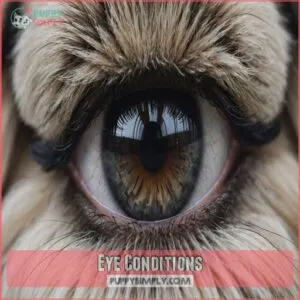This site is supported by our readers. We may earn a commission, at no cost to you, if you purchase through links.
 The Shih Tzu, known for its delightful personality and distinctive coat, typically enjoys a lifespan of 10 to 16 years.
The Shih Tzu, known for its delightful personality and distinctive coat, typically enjoys a lifespan of 10 to 16 years.
Factors such as genetics, diet, and environment greatly impact life expectancy.
These little companions may face issues like Brachycephalic Obstructive Airway Syndrome due to their adorable flat faces, but with regular vet check-ups and a balanced diet, they can live long, joyful lives.
Imagine this: keeping your Shih Tzu fit and fed is akin to prepping for a marathon, not a sprint.
Ready to explore more on extending your furry friend’s lifespan?
There’s a treasure trove of insights ahead!
Table Of Contents
- Key Takeaways
- Average Lifespan of a Shih Tzu
- Factors Affecting Shih Tzu Lifespan
- Common Health Issues in Shih Tzus
- How to Extend The Lifespan of a Shih Tzu
- Nutrition and Diet for a Long and Healthy Life
- Veterinary Care and Lifestyle for a Long Lifespan
- Frequently Asked Questions (FAQs)
- How many years does a Shih Tzu live?
- What is the normal lifespan of a Shih Tzu?
- How long to Shih Tzu live for?
- What is the average age a Shih Tzu lives?
- What is the most common cause of death in Shih Tzus?
- Can a Shih Tzu live 20 years?
- What is considered old for a Shih Tzu?
- How old is the oldest Shih Tzu?
- How does spaying/neutering affect lifespan?
- What are warning signs of aging in Shih Tzus?
- Can neighborhood environment influence lifespan?
- How to manage stress for a longer life?
- Are mixed breeds with Shih Tzu genes longer-lived?
- Conclusion
Key Takeaways
- You’ll typically enjoy 12-16 years with your Shih Tzu, though some can live up to 23 years with proper care.
- You can extend your Shih Tzu’s lifespan through regular vet checkups, a balanced diet, and proper exercise while monitoring common health issues BOAS and dental disease, as genetics also play a significant role in lifespan, which can be further explored in Shih Tzu Lifespan Factors, and dental disease.
- You’ll need to maintain your Shih Tzu’s dental and eye health daily, as these areas are particularly vulnerable and directly impact their longevity.
- You should keep your Shih Tzu at a healthy weight and avoid table scraps, as obesity can significantly reduce their lifespan and lead to other health complications.
Average Lifespan of a Shih Tzu
You can expect your Shih Tzu to be your furry friend for about 12 to 16 years, with some lucky pups even hitting 23.
Like a typical teen who suddenly outgrows their childhood clothes, Shih Tzus fall in that smaller category of dogs known for enjoying longer lives.
Factors Affecting Lifespan
Regarding your Shih Tzu’s lifespan, several factors come into play.
Think of it like a recipe: nutrition, environment, weight control, and exercise are key ingredients, and you can find great products for the latter at Shih Tzu exercise needs.
Stress, like a pesky seasoning, can spoil the mix if not managed.
Choose breeders wisely to dodge genetic pitfalls.
Keep these elements balanced, and your furry friend can enjoy many joyful years with you.
Shih Tzu Longevity Records
Ever curious about Shih Tzu lifespan records? The oldest known Shih Tzu reached a remarkable 23 years! Longevity factors like these not only intrigue but offer insights into their potential lifespan.
- Genetics: Strong gene pool can boost longevity.
- Diet: Balanced, nutrient-rich food is key.
- Environment: Stress-free, loving homes extend life.
Comparison to Other Breeds
Curiosity about Shih Tzu lifespan vs. Poodles, or even comparing them to Maltese?
While Shih Tzus often reach 12-16 years, other small breeds like Poodles or Maltese share similar longevity.
Toy breeds live longer than larger ones.
Here’s a quick table:
| Breed | Lifespan (Years) | Key Traits |
|---|---|---|
| Shih Tzu | 12-16 | Friendly |
| Poodle | 12-15 | Intelligent |
| Maltese | 12-15 | Playful |
| Terrier | 12-16 | Energetic |
| Chihuahua | 12-20 | Fearless |
Factors Affecting Shih Tzu Lifespan
Several factors influence how long your Shih Tzu lives, impacting their overall health and happiness. These include genetics, diet, environment, and regular veterinary care, so let’s explore them!
Genetics and Health Conditions
Think of genetics like a mixed bag of tricks for your Shih Tzu.
Understanding genetic testing and breed standards can help you avoid common issues.
Here’s a quick guide:
- Ethical Breeding: Choose breeders who prioritize health.
- Health Screening: Catch problems early.
- Common Diseases: Stay informed on issues like dysplasia and dental troubles.
These steps can promote longevity!
Nutrition and Diet
Healthy nutrition can help sidestep potential food sensitivities in your Shih Tzu.
Consider exploring Homemade Shih Tzu Food recipes for a fun twist.
Try mixing their meals with variety—considering raw diet options or homemade meals for a fun twist.
Watch treats and snacks, limit table scraps, and maintain a steady feeding schedule.
Remember, their diet isn’t just kibble; it’s love served in a bowl.
Environment and Living Conditions
Creating a safe home environment is really important for your Shih Tzu’s long life.
Make sure their surroundings support healthy living with these steps:
- Home Safety: Keep harmful substances out of reach.
- Toxin Prevention: Secure cleaning supplies and medications.
- Garden Hazards: Remove toxic plants from your yard.
- Exercise Space: Provide ample room for physical activity, boosting well-being.
Keep their indoor air fresh and clean too!
Size and Sex
Bouncing off the need for a safe Shih Tzu environment, let’s touch on size and sex. These pups weigh 9-16 pounds, and smaller sizes often add years to their lives.
Funny enough, both boys and girls have similar lifespans, but gals might squeak out a bit longer.
Neutering can also impact their longevity positively.
| Factor | Impact | Note |
|---|---|---|
| Size | Smaller | Longer lifespan |
| Weight | Light | Increases lifespan |
| Sex | Female | Tends to live slightly longer |
| Neutering | Yes | May extend lifespan |
| Comparison | Equal | Males and females both thrive |
Veterinary Care and Preventative Measures
To keep your Shih Tzu fit and flourishing, regular vet visits are your secret weapon.
With a proper vaccination schedule, routine parasite control, and diligent dental care, you’re setting the stage for a longer, happier life.
These preventative screenings and early detection of issues make sure you’re not just winging it but actively boosting your furry friend’s health and longevity.
Common Health Issues in Shih Tzus
You’re curious about keeping your Shih Tzu healthy, aren’t you?
These charming pups can face a few medical hurdles, like breathing issues from their signature snub noses and dental problems due to their petite mouths.
Brachycephalic Obstructive Airway Syndrome
Understanding your Shih Tzu’s health is key to a long life together.
Let’s talk about Brachycephalic Obstructive Airway Syndrome (BOAS).
It’s a common problem for flat-faced breeds like Shih Tzus.
Watch for these signs:
- Noisy breathing.
- Difficulty breathing.
- Snorting.
- Exercise intolerance.
Early BOAS diagnosis is important.
Your vet can help with BOAS management and treatment.
Prevention involves choosing a responsible breeder.
Dental Disease
Think taking care of your Shih Tzu’s teeth as playing defense for their health.
Dental disease, a sneaky little gremlin, loves neglect.
Regular tooth brushing and dental hygiene are your best friends.
Healthy gums mean happy pups.
Picture your Shih Tzu grinning, their pearly whites gleaming, thanking you for the attention.
Remember, strong teeth lead to a stronger lifespan.
Eye Conditions
Watch those big, adorable eyes. Shih Tzu eye care is key, as they’re prone to issues like corneal ulcers, tear stains, and dry eye.
Regularly monitoring their eye development is essential, just like keeping track of puppy eye milestones.
Eye infections can sneak up on you, so keep them clean and clear. Here’s your checklist:
- Daily eye cleaning.
- Be alert for redness.
- Use vet-approved drops.
- Regular eye checks.
Patellar Luxation
Ever notice your Shih Tzu limping or skipping steps?
Patellar luxation might be the culprit, a fancy term for a slipping kneecap.
Symptoms include limping and reluctance to jump.
Treatment ranges from physiotherapy to surgery, depending on severity.
Prevention involves maintaining a healthy weight.
Regular vet check-ups aid in early diagnosis and help keep those tails wagging!
Renal Dysplasia
After discussing patellar luxation, let’s touch on renal dysplasia in Shih Tzus.
This genetic condition affects kidney development, leading to early renal failure.
Key strategies focus on early detection and genetic testing.
Though challenging, there are treatment options and prevention strategies to manage symptoms.
Regular vet visits help provide the best prognosis, giving your pet a fighting chance for a longer life.
How to Extend The Lifespan of a Shih Tzu
To keep your Shih Tzu healthy and extend their lifespan, focus on regular veterinary care, a balanced diet, and exercise.
You might find that just like humans, a little fetch and fewer treats go a long way!
Prioritizing Preventative Veterinary Care
Tackling Shih Tzu health issues like BOAS is half the battle.
Prioritizing preventive care is key.
Regular checkups and a vaccination schedule act like a safety net.
Don’t skip on parasite control and stay on top of dental health—nobody likes a sore mouth!
Here’s your checklist:
- Regular checkups
- Vaccination schedule
- Parasite control
- Dental health
Maintaining a Balanced Diet
Regular vet checkups are a great start to a long and happy life for your Shih Tzu.
Now, let’s talk food! A balanced diet is key. Think of it as fuel for their tiny engine.
| Food Type | Pros | Cons | Considerations |
|---|---|---|---|
| High-quality kibble | Convenient, balanced nutrition | Can be expensive, potential food sensitivities | Choose brands with high meat content. |
| Homemade food | Control over ingredients | Requires research, time commitment | Consult your vet for a personalized recipe. |
| Treats & snacks | Reward good behavior, enrichment | Can lead to weight gain if overfed | Offer sparingly, choose healthy options. |
| Raw food diets | Natural, nutrient-rich | Risk of bacterial contamination | Source ingredients carefully, handle safely. |
Remember, fresh water is always a must!
Ensuring Regular Exercise and Mental Stimulation
Keeping your Shih Tzu lively means diving into a mix of Shih Tzu playtime and mental enrichment games, incorporating activities that meet their instinctive needs, such as leash exploration and scent games.
which are part of proper puppy exercise
Picture a daily exercise routine full of indoor exercise options like hide-and-seek or fetch games, perfect for preventing boredom.
Just 20 minutes can make tails wag and minds sharp, nurturing their adventurous spirit while keeping them healthy and happy.
Dental Care and Eye Care
Every Shih Tzu deserves shiny teeth and bright eyes.
Get started with dental health by following these steps:
- Brush those teeth: Daily brushing prevents dental health risks. For this, you can use a Shih Tzu Toothbrush.
- Tackle tartar: Use dog-specific toothpaste to combat buildup.
Eye care is equally important:
- Eye cleaning matters: Wipe gently to avoid eye issues in Shih Tzus.
Finally, remember:
- Vet visits: Regular visits catch problems early.
Consistency keeps their smiles and eyes gleaming!
Spaying or Neutering
While tending to dental and eye care, consider spaying or neutering your Shih Tzu.
It isn’t just about preventing surprises—it’s about enhancing their health.
Spaying reduces uterine infections, while neutering curbs testicular cancer risks.
So, what’s the best spaying age? Around six months is ideal, balancing health benefits with maturity.
It’s like getting your car’s oil changed before issues arise!
Nutrition and Diet for a Long and Healthy Life
Feeding your Shih Tzu high-quality dog food in appropriate portion sizes is essential for its long and healthy life.
Don’t be tempted by those big eyes; avoid table scraps and always provide fresh water to prevent obesity.
High-quality Dog Food
Let’s talk dog food: it’s not just about filling bowls.
Choosing high-quality dog food plays a big role in your Shih Tzu’s longevity.
Look for brands that meet AAFCO standards, ensuring quality ingredients, whether it’s kibble or raw.
Consider nutritional supplements for added benefits.
It’s like giving your furry friend a gourmet meal every day, keeping them healthy and happy.
Appropriate Portion Sizes
When feeding your Shih Tzu, size matters—both theirs and their portions!
Consider their weight, age, and activity level using a portion calculator.
Balancing calories and meal frequency makes sure they’re not packing extra pounds.
Think of it as crafting the perfect diet plan; a well-fed pup is a happy, healthy one!
Avoid Table Scraps and Human Food
Resist the urge to share your dinner!
Giving your Shih Tzu table scraps is risky.
Many human foods are toxic to dogs.
Onions, chocolate, and grapes are big no-nos.
Stick to their dog food.
Healthy treats are okay, but in moderation.
Homemade meals should be vet-approved.
Remember, a balanced Shih Tzu diet is key for a long and happy life.
Avoid the human food dangers!
Provide Fresh Water
While sparing your Shih Tzu the extra treats, make sure their water quality is excellent.
Fresh water isn’t just a luxury; it’s life’s nectar.
Keep water bowls clean and filled to entice steady hydration.
With easy water access, your pup stays quenched, just like keeping a cool drink handy on a blazing day.
Watch their water intake for good health.
Avoid Overfeeding and Obesity
As you fill your pup’s bowl, remember that portion control is key.
Too much food can lead to chubby troubles.
Understanding your Shih Tzu’s caloric intake needs is essential to prevent overfeeding and obesity.
Keep an eye on their weight, mixing in healthy treats and incorporating a daily exercise routine.
Consider any food sensitivities your Shih Tzu might have.
This balance helps them stay fit and happy, dodging unnecessary vet visits.
Veterinary Care and Lifestyle for a Long Lifespan
To give your Shih Tzu the best shot at a long, healthy life, prioritize regular veterinary check-ups and keep up with vaccinations and parasite prevention.
Combine this with proper grooming, a safe environment, and stress management; you’ll have one happy and hopefully long-lived pup, even if they still think the vacuum is out to get them!
Regular Veterinary Check-ups
A Shih Tzu’s longevity hinges on regular vet check-ups; think of them as a health tune-up. Here’s why:
- Preventative Care: Catching issues early keeps your pup wagging happily for years.
- Early Detection: Spotting problems before they bloom into big concerns saves heartache and money.
- Health Monitoring: Regular visits maintain your beloved Shih Tzu’s health baseline. Now, that’s peace of mind!
Vaccination and Parasite Prevention
Preventative care, including vaccinations, is key to your Shih Tzu’s health.
Shih Tzu vaccinations protect against diseases, while parasite prevention keeps pesky fleas, ticks, and worms at bay.
Stick to a regular vaccination schedule to shield your pup from common parasites.
It’s like building a fortress around your Shih Tzu’s well-being, ensuring they’re happy and healthy for years to come.
Grooming and Coat Care
Keeping your Shih Tzu’s coat in tip-top shape can feel like a bonding session.
Regular grooming helps avoid pesky mats and keeps their luscious locks gleaming.
- Brush daily for mat prevention.
- Trim hair around eyes and paws.
- Bath frequency: every 3-4 weeks.
- Use a dog-friendly shampoo.
Enjoy the extra cuddle time you get during grooming!
Avoiding Stressful Situations
Neatly groomed fur is one thing, but a calm Shih Tzu is even better! Shih Tzus can be sensitive to loud noises, so keep things quiet during storms or fireworks.
Travel can be stressful; prepare them slowly. Vet visits should be positive experiences, starting with short, happy visits.
Separation anxiety? Try leaving a comforting toy. Even grooming can be stressful; keep sessions short and rewarding.
A relaxed pup is a happy pup!
Providing a Safe Living Environment
Think of creating your home as a fortress for Shih Tzu safety.
Eliminate home hazards by keeping toxins and medicines out of reach.
A secure garden keeps them from playing with harmful plants.
Regularly inspect your space, ensuring it’s safe for wandering paws.
Safe playtime means no sharp edges or choking hazards in sight.
Frequently Asked Questions (FAQs)
How many years does a Shih Tzu live?
Picture a tiny lion in your lap, ruling your heart for 12 to 16 years.
Shih Tzus often share their lives with you for about that span, with some lucky ones reaching over 20 years.
What is the normal lifespan of a Shih Tzu?
Shih Tzus typically live between 12 and 16 years.
It’s not uncommon for a lucky Shih Tzu to reach their late teens.
Providing a balanced diet, a safe environment, and regular vet check-ups is essential.
How long to Shih Tzu live for?
A Shih Tzu typically lives between 12 and 16 years.
With great care, including a balanced diet and regular vet checkups, similar to the factors impacting the lifespan of Maltese poodle, some Shih Tzus live even longer.
Their charm and energy can fill years with joy and adventure.
What is the average age a Shih Tzu lives?
On average, your Shih Tzu can live a long and happy life, from 12 to 16 years. Some even reach their twenties! Genetics, diet, and care all play a part.
What is the most common cause of death in Shih Tzus?
When it rains, it pours; in Shih Tzus, aging gracefully can get tricky.
Heart disease, particularly mitral valve disease, is a leading cause of death.
Regular vet check-ups can manage symptoms and extend their joyous companionship.
Can a Shih Tzu live 20 years?
Absolutely, a Shih Tzu can live 20 years, though it’s unusual.
Longevity depends on diet, genetics, and care.
Picture it like a rare vintage wine; with the right conditions, it can age beautifully.
What is considered old for a Shih Tzu?
A Shih Tzu is considered elderly around 10 to 12 years old.
Think of it like a seasoned veteran, needing more care, love, and perhaps a cozy spot on the couch for those golden years.
How old is the oldest Shih Tzu?
The oldest Shih Tzu lived to an incredible 23 years.
It’s like having a furry tumbler clock that just keeps ticking!
With good care, your Shih Tzu might also give you decades of companionship and barking serenades.
How does spaying/neutering affect lifespan?
Spaying or neutering your pet can add years to their life by preventing certain cancers and infections.
It’s like nature’s insurance policy, keeping potential problems at bay while ensuring a healthier, longer companionship with your furry friend.
What are warning signs of aging in Shih Tzus?
Look out for changes like decreased energy, joint stiffness, problems with vision or hearing, and increased sleep.
These signs suggest your Shih Tzu might be aging.
Regular vet visits help monitor these changes and keep them comfortable.
Can neighborhood environment influence lifespan?
Yes, a stressful neighborhood can shorten your dog’s life. Noise, poor air quality, and lack of safe outdoor space all impact well-being. A peaceful environment helps them thrive.
How to manage stress for a longer life?
Balancing serenity with life’s chaos is key.
Try deep breathing exercises, laugh often, and invest time in hobbies you love.
Regular physical activity boosts mood, while mindfulness tames stress.
Surround yourself with supportive people for resilience.
Are mixed breeds with Shih Tzu genes longer-lived?
Mixed breed Shih Tzus often inherit the hybrid vigor advantage, potentially living longer than purebreds.
Your mixed pup might enjoy better health and fewer genetic issues, though individual care and lifestyle still play a key role.
Conclusion
Research shows that well-cared-for Shih Tzus can exceed the average shihtzu lifespan by 2-3 years.
Your furry friend’s journey to a long, healthy life starts with you.
By following these care guidelines, staying on top of vet check-ups, and maintaining proper nutrition, you’re setting your companion up for many joyful years together.
Remember, every small effort you make today – from dental care to regular exercise – contributes to those precious extra years of tail wags and cuddles.
















